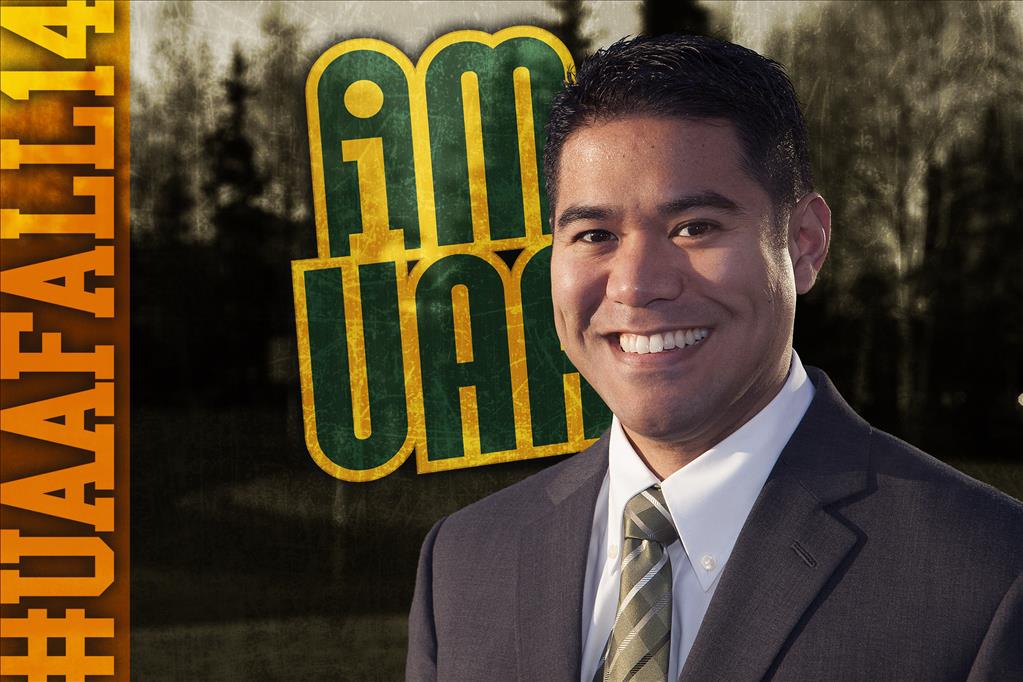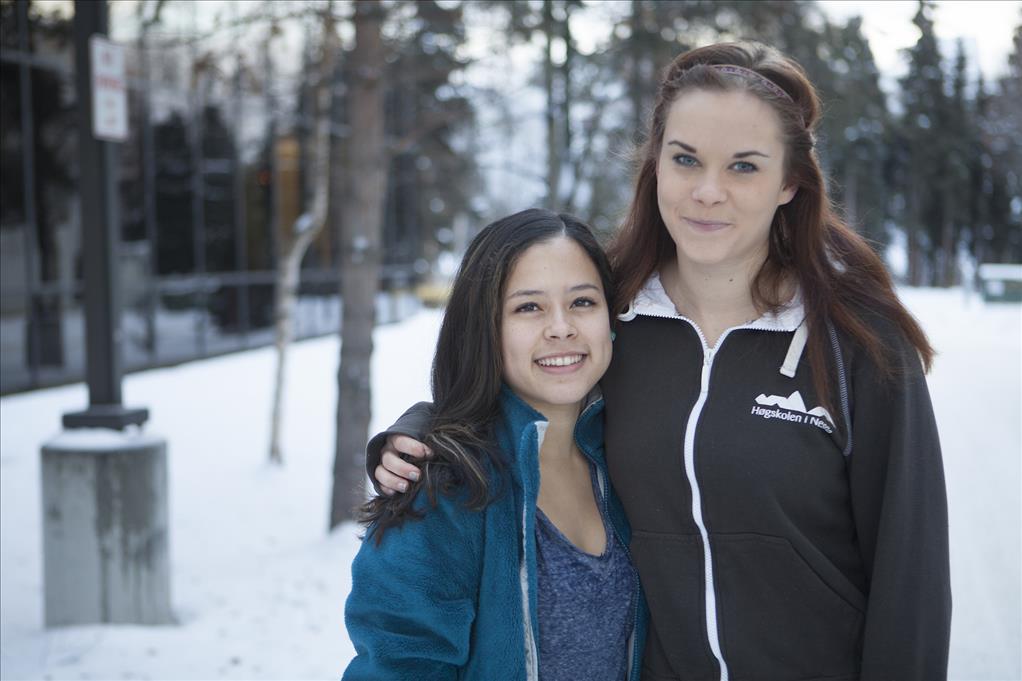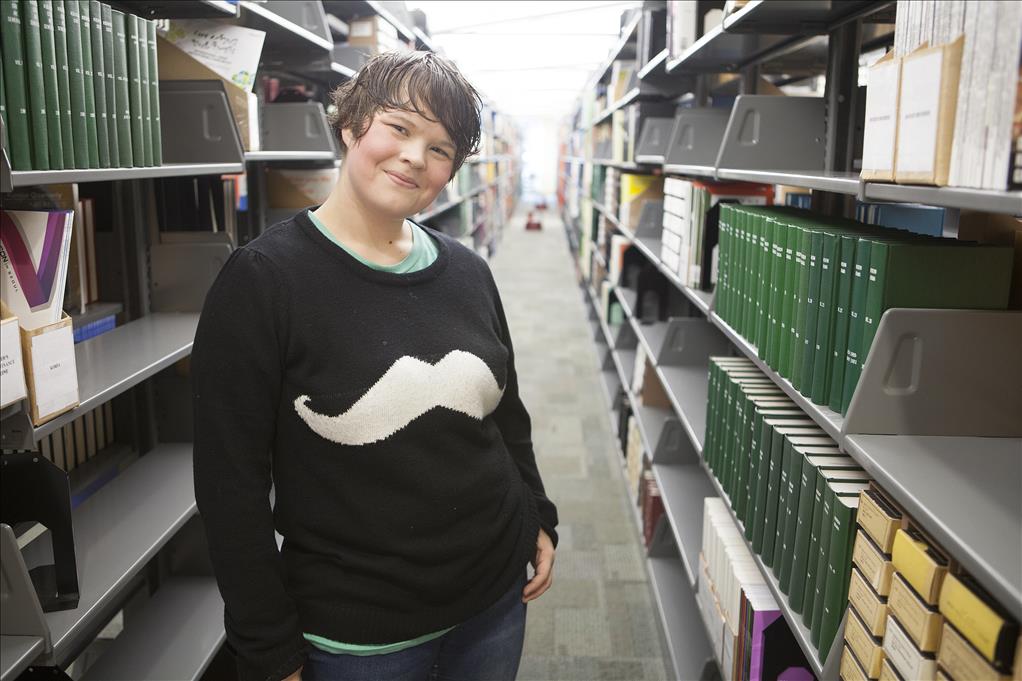Student Spotlight: Jack Runser
by Tracy Kalytiak |
Student Spotlight: Jack Runser B.A. Human Services, Class of 2015 Hometown: Wasilla, Alaska Fun Fact: Jack just bought a home in Ohio.
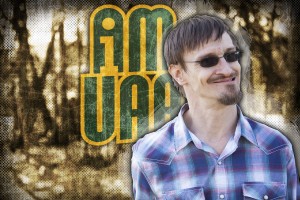
Jack Runser, a UAA Human Services student, battles stereotypes of what it means to be disabled. Photo by Philip Hall/University of Alaska Anchorage
Jack Runser wrestles against cerebral palsy, willing his rebellious body to move the way he wants it to move. His willpower is especially important because Jack lives in silence; he must use his hands and arms to "talk" to other people with gestures.
CP and deafness are minor nuisances, however, compared to other obstacles Jack confronts while he's out with friends, working or enjoying the outdoors.
"The biggest challenge is the fact I have to prove myself every single day and step in life," said Jack, who is pursuing a UAA bachelor's degree, in Human Services. "Even my family, some of them question and try to keep me from pushing 'too hard.'"
Jack says he constantly battles communication barriers.
"There's a lot of misunderstanding," he said. "Women are afraid of me; maybe they mistrust me because I'm a 'different' person. They avoid me. A lot of people assume I'm less than intelligent-they think I'm feebleminded, really."
Some people with CP do have other disabilities that influence the ways they learn and think, Jack said, but most people who live with CP are quite intelligent. "You have to take people as individuals and not prejudge them," he said.
Achieving the impossible
Jack fights his body more than most people have to. Even so, for decades he maintained a rigorous regiment of weightlifting so he could participate in bodybuilding competitions at the state and national levels. He also wrestled, hiked a challenging trail to the 6,350-foot south summit of Pioneer Peak, rode horses, explored part of the Grand Canyon.
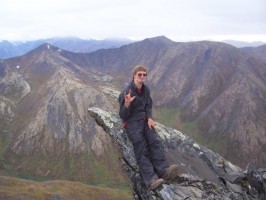
Jack Runser climbs Pioneer Peak, in this 2009 photo. He's climbed the mountain five times. Photo courtesy of Jack Runser
"I enjoy the peacefulness of forests and just the beauty of nature," Jack said of his craving to be outside.
Jeff Storch, a bodybuilder who competed alongside Jack in the 2006 National Physique Committee (NPC) Jr. Nationals, once wrote about meeting Jack.
"He talks on what is like a mini word processor," Storch wrote. "I was talking with [another] competitor...when Jack handed me his word processor. On it, Jack had written, 'You two guys look so good. I am so impressed with all you have accomplished with your physiques!'
"I was just floored by this," Storch said. "Here I am looking at this man who has such a terrible disease and he is sitting there just ripped (with defined muscles, very little body fat) telling me how much my fellow competitor and I have accomplished. I actually almost choked up right there. I felt so good about what I had gone through to get where I was and then I looked at this man who basically did the impossible."
That determination didn't go unnoticed-the NPC twice named Jack as its most inspirational bodybuilder.
CP inflicted so much stress on Jack's body over the years that he finally had to stop bodybuilding and dial back on his hiking, yet he still camps with friends, kayaks on Prince William Sound, rides four-wheelers and snowmachines with his father, who was left paralyzed from the chest down after an accident in 1997.
"I miss hiking more than words can say, but that's a chapter closed," Jack said.
Nothing hinders Jack's mind, however. There, he roams free.
'I pushed my limits, always'
Jack began his journey with cerebral palsy 43 years ago, when Rh-factor incompatibility caused his mother's antibodies to attack the red blood cells of her unborn son. Red blood cells carry oxygen, so this attack reduced the amount of oxygen he received and disrupted development in parts of his brain governing hearing and movement.
"I pushed my limits, always," said Jack, who grew up with four older sisters. "From the time I was a baby I had that drive inside of me. It's natural. So when I was a baby and the doctors told my parents I would never be independent, much less be able to walk, I remember I'd just be sweating buckets and working even just to crawl. So I had that natural fighting tendency inside me. And, as someone born deaf, I was very lucky because my parents required all my siblings to learn sign language."
Jack said his parents encouraged him to push his limits.
"My mother wanted to protect me," he said. "That's normal for kids with disabilities; the parents want to be protective of their children."
His father came up with ideas to help Jack with his coordination, especially on the family's hiking and camping outings all over the state.
"When I was young and we would go hiking, I would be in the backpack behind my father," Jack said. "I wasn't content to just sit in the backpack, so my father came up with an idea of having a bar on his back behind him. I would hold onto the bar and just follow, walking behind him. One thing you have to understand is I would always, always fall down. It got so that my dad, myself and the nurse were on a first-name basis and at the doctor's office, they kept my file in the front of the office."
Jack attended a school with a deaf program, in Anchorage, until fifth grade.
"Then it was decided I would be put in a completely mainstream setting," he said. "It was a really lonely time for me, but if I could go back in time and change it, I wouldn't."
Finding sanctuaries
His family moved to Wasilla. Jack's father worked as a teacher at East High School, so Jack would commute with his father to Anchorage every morning.
"It worked out just fine for me," he said.
Jack completed elementary school, then enrolled in Wasilla Junior High School.
"Understand though, I was the only deaf person in the entire school," Jack said. "The same time this was happening, my parents started going through a very bitter divorce. It was bad."
Jack started lifting weights in junior high. "My goal was always to compete on the national level, but not to necessarily win, just to compete at the national level," he said. "My goal was to show people that persons with disabilities can do it, whatever it is. Persons with disabilities can do it if they have the drive."
Jack transferred to Palmer High School after finishing junior high, and began wrestling in addition to bodybuilding competitively. He also immersed himself in 4H.
"I raised sheep and pigs for auction and for my family to eat," he said.
He graduated from West High School and then attended Gallaudet University, a private university for the deaf, in Washington, D.C. Later, he attended Mat-Su College and then enrolled at UAA. He holds two associate degrees-one in general studies, the other in human services-and has worked as an intern for Access Alaska.
"I love helping people. Always have, always will," Jack said in a 2008 interview with the Mat-Su Valley Frontiersman.
"The love of the outdoors" is what drew Jack to UAA. "There are also less cliques on campus," he said. "What I've enjoyed most about my experience is meeting all kinds of people, being able to bridge that divide."
Jack said UAA provided a haven in a world that hasn't always offered friendliness to him.
"Wherever I go, I have to face prejudice and discrimination head-on," he said. "Part of that is because I'm on the edge of acceptable boundaries, always pushing the limits."
Smoothing the path
Three years ago, Jack slipped into a taxi outside his home in Anchorage, preparing to ride to an appointment he had with someone who was going to counsel him about getting a job.
"I sat in the cab, motioned that I can't hear and was writing a note," Jack said. "The driver looked at me like he was asking me, 'Where do you want to go?' So I repeated, 'I cannot hear you, I'd like to write it down for you.' The cab driver had an angry facial expression and said something like, 'Get out of my cab.' I was reading his lips."
The cab driver said he would call the police. Jack didn't get out of the cab.
"He got out of the cab," Jack said. "I knew his intention. He opened the door and I slid over on the car seat. He went around to the other side and opened the door. Then he grabbed my ankles. We struggled for maybe five minutes and finally he dragged me out, threw me on the asphalt. I lost my glasses in the struggle we had. I stood, knocked on the window, pointed to the back of the car. He took out the glasses and threw them out the window."
The driver later told police he didn't understand Jack was deaf. No charges resulted, but Jack recounted his story for the Anchorage Assembly last year, to raise awareness among policymakers of the communication snags people with disabilities often face.
The encounter badly injured Jack's ankle.
"One thing I don't think they realize is that the injury, just an injury, took potentialities away, which are already limited for a disabled person," Jack said, in comments he made to people associated with the cab incident. "That's a bitter pill for me to face."
Prejudice also emerged while Jack was engaged to a woman, a few years ago.
"I went to the mall with my ex-fiancée," Jack said, "and one of the first assumptions people would make when they met her was usually that I was either her client or her son. It's just a fact of life for me, but it took a toll on my relationship. It didn't matter if this was my ex-fiancée, a girlfriend or a date. It took a very heavy toll. But I dealt with it head-on; I would tell people I'm responsible for myself. It was very hard for my fiancée, and, sadly, that contributed to the relationship not working out."
Finding his bliss
The most difficult aspect of living with cerebral palsy, Jack says, is the label.
"People saying you can't do it," Jack said.
That's what Jack experienced when he hired a guide to take him down into the Grand Canyon in 2009. The guide arrived at his hotel while Jack was finishing his waffles. Jack motioned for the guide to wait and then left to get his gear. Jack stepped out of his room and saw the guide driving away.
"The manager of the hotel gave me the news the tour [was] refusing to take me," Jack said. The guide claimed, then, that Jack didn't tell him he had cerebral palsy. Jack said that fact had been on paperwork he gave the guide's company.
A friend took Jack into the Grand Canyon on a hike a few days later. Pictures he posted on Facebook afterward show Jack hiking down rough cliffside trails, crossing a narrow bridge, perched on rocks amid rugged terrain. Jack grins, in every picture.
"I'm paying the price," Jack wrote afterward. "Toe hurts. A blister, I opened it yesterday, hurts today, but very happy I went into that beautiful, savage Grand Canyon."
Written by Tracy Kalytiak, UAA Office of University Advancement
 "Student Spotlight: Jack Runser" is licensed under a Creative Commons Attribution-NonCommercial 4.0 International License.
"Student Spotlight: Jack Runser" is licensed under a Creative Commons Attribution-NonCommercial 4.0 International License.










